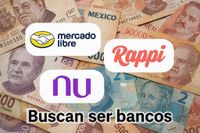Nu Holdings Ltd. (NYSE:NU), a financial services company valued at $52 billion, has made headlines recently with its impressive revenue growth of nearly 49% over the past twelve months. The company announced today that it has submitted its annual report for the fiscal year ending December 31, 2024, to the U.S. Securities and Exchange Commission (SEC). This report, known as Form 20-F, is a requirement for foreign private issuers in the United States and provides a comprehensive overview of the company's financial performance, including audited financial statements.
Operating under the brand Nubank, Nu Holdings is incorporated in the Cayman Islands and has its executive headquarters in Grand Cayman. According to InvestingPro, the company maintains a healthy return on equity of 28% and trades at a price-to-earnings (P/E) ratio of 28.7, with analysts expecting continued profitability this year. Investors and stakeholders can access the documents on the company’s investor relations website. Additionally, shareholders can request a printed copy of the report, which includes the audited financial statements, at no cost by contacting the company via email.
This filing ensures that Nu Holdings complies with U.S. market regulations by providing transparency and detailed financial information to its shareholders and the market at large. The company’s commitment to maintaining strict reporting standards is crucial for preserving investor trust.
In other recent news, Nu Holdings reported fourth-quarter revenues of $2.99 billion, surpassing analyst expectations of $2.74 billion. Despite this positive outcome, the company’s stock experienced a decline due to concerns over a contraction of 70 basis points in net interest margins, attributed to exchange rate volatility and deposit strategies in Mexico and Colombia. In response to these challenges, Nu Holdings announced a management restructuring aimed at improving customer focus and operational efficiency, with CEO David Vélez taking direct control of the management team.
On a positive note, the company added 4.5 million customers in the fourth quarter, bringing its total to 114.2 million, marking a remarkable 22% year-over-year increase. Meanwhile, JPMorgan upgraded Nu Holdings' stock rating from Neutral to Overweight, although it reduced the price target to $13.00 from $14.00. Analyst Yuri Fernandes highlighted the potential for significant earnings growth over the next three years, despite conservative estimates. In contrast, Citi maintained a Sell rating with a price target of $9.00, citing seasonal banking trends in Mexico that Nubank has managed to outperform. Citi's analysis emphasized Nubank's growth in deposits and loans during typically slower periods, attributing this to the bank's early growth phase and strong brand recognition.
As Nu Holdings continues to evolve, it faces challenges and opportunities in the Mexican banking landscape. Digital platforms like Mercado Libre, Rappi, and Nu are striving to become banks, yet they encounter significant hurdles due to distrust and lack of connectivity among potential customers. These platforms, hailing from various Latin American countries, have transformed e-commerce and financial services with innovative solutions that promise to simplify user experiences.
However, the shift to formal banking entails navigating a complex regulatory landscape and overcoming cultural and structural challenges. A primary barrier to the widespread adoption of digital banking in Mexico is the lingering distrust among users. Many individuals still prefer visiting physical branches for transactions, perceiving greater security in face-to-face interactions with bank representatives. This sentiment is exacerbated by a lack of financial education and limited digital culture in certain segments of the population.
Moreover, the country's technological infrastructure poses an additional challenge. In many regions, especially rural and marginalized areas, internet connectivity is either limited or nonexistent, preventing thousands from accessing digital platforms, let alone fully online banking services. Despite these obstacles, companies like Nu have taken significant steps toward financial inclusion. For instance, Nu offers commission-free credit cards and a fully digital approach that has resonated with younger consumers.
Rappi has also made strides by developing its electronic wallet, RappiPay, aiming to compete in the financial ecosystem. Meanwhile, Mercado Libre has bolstered its financial arm with Mercado Pago, a tool that provides services such as loans, payments, savings, and investments. However, as of April 17, 2025, none of these companies have secured a full banking license in Mexico, largely due to the stringent regulatory requirements imposed by the Comisión Nacional Bancaria y de Valores (CNBV).
In a significant development, Nu Mexico recently obtained a license to operate as a bank in Mexico, as reported by anonymous sources to Reuters. This authorization from Mexican financial authorities marks a milestone for Nu Mexico, allowing it to offer a broader range of financial products and services, thereby solidifying its presence in the country. Nu Mexico is currently recognized as a Sofipo, an entity focused on promoting savings and expanding financing access for low-income groups. The transition from Sofipo to bank will not negatively impact current users; their credit cards and accounts will continue to function as usual, with potential future enhancements.
As a bank, Nu Mexico will be able to offer additional financial services, including payroll products, investment options, insurance, and a marketplace. This could streamline the financial lives of users by consolidating services in one platform. Customers are advised to stay informed through official communication channels from Nu regarding any relevant changes to their services.
In summary, Nu Holdings is navigating a dynamic landscape as it transitions into a full-fledged bank in Mexico while maintaining its growth trajectory. The company’s innovative approach and commitment to financial inclusivity position it well for future success in the evolving digital banking sector.





